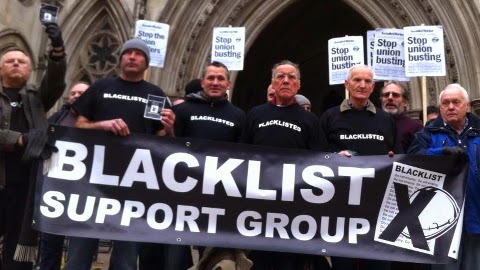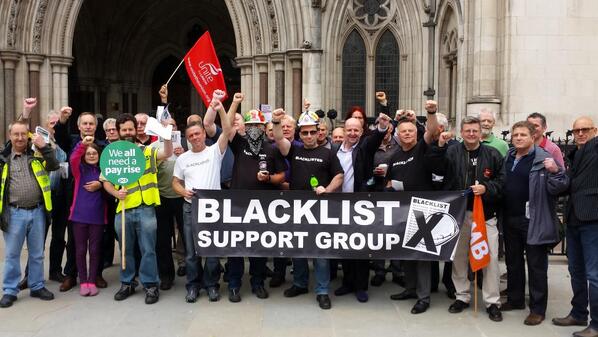
Last week eight major construction firms involved in the industry’s blacklist made a fresh attempt at giving compensation for their illegal activity and the hardship it caused. It has been roundly dismissed by the workers and unions.
THE BLACKLIST AND STATE SPYING
The construction blacklist was run by a company called the Consulting Association. When the Information Commissioners Office (ICO) raided in 2009 they found 44 firms had used it including most of the big names in the industry. More than 3,000 people were on the list, many with files dozens of pages long including information about their family.
Most were on the list for workplace organising. Dave Smith told parliament
Virtually everything in my file relates to where I have raised concerns about health and safety, asbestos, toilets overflowing on building sites and a young lad falling off the third floor of scaffolding…
Throughout my file, there is nothing that mentions my doing anything other than raising concerns about health and safety, conducting normal trade union activities, giving interviews to various organisations and raising concerns about unpaid wages. Nowhere am I accused of doing unofficial strikes or anything like that; that just isn’t the case.
Whilst most information came from employers, the files also included material that could only have come from the police or MI5. The Independent Police Complaints Commission has conceded that it was likely to have been a routine part of Special Branch work across the country to supply this illegal list. Undercover police whistleblower Peter Francis says he not only infiltrated anti-racist organisations and was sent to find material to smear Stephen Lawrence’s family – he also believes his intelligence was used for the construction blacklist.
The undercover National Public Order Intelligence Unit (NPOIU) that deployed the likes of Mark Kennedy was only one of three units run by the Association of Chief Police Officers. They also ran the National Domestic Extremism Unit that collated the intelligence from NPOIU officers, and the National Extremism Tactical Co-ordination Unit (NETCU) which advised companies who were the target of protesters. It is known that NETCU met with the Consulting Association but the ICO is refusing to release the details of what went on.
The Metropolitan Police initially dismissed a complaint from the Blacklist Support Group alleging police collusion but, following publication of a posthumous interview with the Consulting Association’s Ian Kerr detailing a meeting with a ‘key officer’ from NETCU, they’ve launched an investigation. There can be no credibility in yet another self-investigation from police who’ve already demonstrated their reluctance on this issue.
The scale of the blacklist is staggering.
In the period between 1996/7 and 2003/04, the Carillion group, (trading as Tarmac/ Carillion/ John Mowlem) paid £83,161.00, and was then the third largest supporter and user of the blacklist. This spending broke down as an annual fee of £3,500, plus a fee of up to £2.20 per name to check information on the unlawful database.
At £2.20 a time, it means they made nearly 30,000 name checks – and there were two even larger users. As the list was secret, there was no way to check the veracity of the information, nor to get off it. Workers were cast out of their trade for life. Some people were never in the trade – one was a teacher who had a file due to being on an anti-racist demonstration. Around 200 environmental activists also had files.
THE INSULT OF THE OFFER
Ian Kerr, the man who was paid £46,000 a year to ruin thousands of lives with the Consulting Association, was fined £5,000. The companies who paid for it were let off with a warning. The eight of those firms in the compensation offer make pre-tax profits of over a billion pounds a year.
This week’s basic compensation offer is for a fast-tracked £4000, rising to £20,000 for those who can prove discrimination. With blacklisters by definition having suffered hardship and waited years for compensation, many will be tempted to take the offer. For those prepared to spend up to six months arguing and have irrefutable proof of the worst damage done, there is a cap of £100,000 compensation. Some of these people went without work for many years. For a lot of people on the blacklist the loss of earnings exceeds £100,000, and that’s before interest, let alone any consideration of the impacts on their privacy, psychological welfare, their home life and the upbringing of their children. As Dave Smith said,
I was a qualified engineer and during one of the longest building booms this country has ever known, my children were on milk tokens
People had breakdowns, some attempted suicide. Some changed their identities to try to get work. Whilst the companies have issued a statement saying they believe were wrong to use the list, the insultingly paltry figures in this attempt at a settlement suggest otherwise. It appears that their only real regret is that they have been caught.
THE DEMAND FOR JUSTICE
The construction blacklist is yet another example of different pillars of the establishment unethically and illegally working in concert to protect their position. It is further proof of the anti-democratic remit of the undercover police who sought to stifle active politics on the spectrum outside the sliver that is represented in the House of Commons. The construction workers’ fight for truth and justice is another facet of the same struggle of the black justice campaigns, environmentalists, social justice activists, anti-fascists and others who were spied on and abused by Britain’s political secret police.
The case is back in court next week (hence the timing of the new offer of compensation). The blacklist Support Group has organised a protest outside the hearing which has already had pledges of support from union members from UNITE, UCATT, GMB and the RMT as well as environmental activists.
Where: Royal Courts of Justice, Strand, London WC2N 5HX
When: 9-10am on Thursday 10th July.
Blacklist Support Group blog
Blacklist Support Group on Facebook
Dave Smith on Twitter


